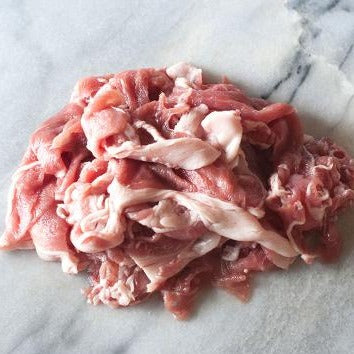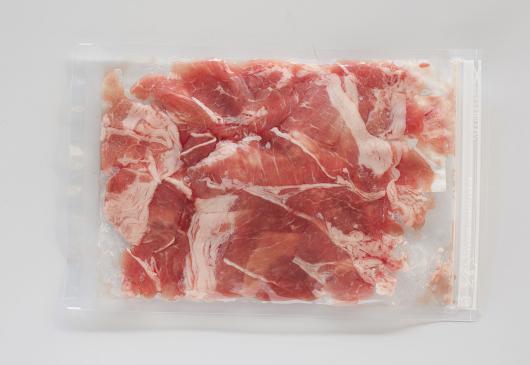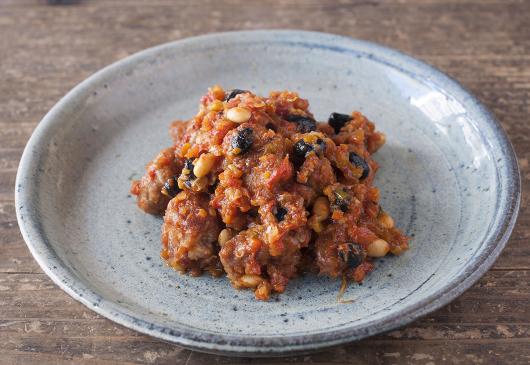〈 Kikuchi City, Kumamoto Prefecture 〉 Katsunori Muto
Yamaai Village Raised Natural Pork, Kata-Ude
Yamaai Village Raised Natural Pork, Kata-Ude
Couldn't load pickup availability
"Natural pigs raised in Yamaai Village" by Mr. Muto from Kikuchi City, Kumamoto Prefecture
Kikuchi City, Kumamoto Prefecture. About an hour's drive from Kikuchi city, deep in the mountains, is the farm "Yamaai Village" run by Katsunori Muto.
Yamaai Village is located on a vast site the size of several mountains, and as its name suggests, it is located deep in the mountain paths.It is an experiential farm reminiscent of a rural mountain village, filled with rich nature and many animals.
Mr. Muto is the second generation mayor and manager of "Yamaai Village." Since his father's generation, the village has been cleared of the mountains and the land has been expanded little by little, and he is now the one who mainly manages it.

The cows grow up healthy and thrive on a vast expanse of land carved into the mountains, where they are allowed to graze all year round.
A "paradise for pigs" created by clearing the mountain
The vast grounds are dotted with a completely free-range chicken coop, a log-grown shiitake mushroom cultivation area, fields, rice paddies, orchards, and a pig farm that makes use of the natural mountains.
The farm is so large that it is necessary to move around in a light truck.
We were immediately taken to where the pigs were, and the sight made us exclaim, "Wow!" There, we saw pigs running around, grooming themselves, taking naps, and all looking very happy as they lived freely.

The pigs are sleeping peacefully in the shade of the trees.
Yamaai Village is a village that is based on free-range grazing, so there are no pig sties, but there are 30 pig-related areas scattered around the premises.
Each square is approximately 10 ares (100m x 100m) and houses only 15 pigs.
This is overwhelmingly larger than a typical pig farm, where pigs are kept crowded together with no room to move.
"Our goal was to create an environment where each animal could live freely, and this is what happened," says Muto.

The pigs have become very attached to Mr. Muto.

Because he was raised in a stress-free environment, he has a very calm and gentle temperament.
Natural grazing without reliance on antibiotics or other drugs <br>Muto's pigs are raised according to a policy that does not rely on or administer antibiotics or other drugs.
As a result, some of the pigs have caught colds.
"When the cold season comes, some of the pigs catch colds.
But basically, we'll just leave it to nature and keep an eye on it.
Because they are raised in an environment close to nature, they almost always recover naturally (laughs)." When grazing without antibiotics or medicines, pigs are more likely to get sick if they stay in the same place for a long time, so the pigs only spend time in about 10 of the 30 open spaces.
The area with pigs is rotated between areas with and without pigs for a set period of time, which is designed to prevent the pigs from getting sick.

Anyway, he is surprisingly friendly!
The food is homemade vegetable scraps and rice scraps.
The chickens are fed a balanced diet of non-GMO, semi-homemade mixed feed, homemade vegetable scraps, rice waste, and organic vegetables from the neighborhood.
He says that when he thought about the pigs and the people who eat them, it was only natural that he came up with this type of feed.
I imagine it must be extremely difficult to create an environment that supports 150 pigs, but they also told me that they hope to ultimately provide all of the feed themselves.

They are fed a diet of non-GMO feed, vegetable scraps from local farmers, and homemade vegetable scraps.

The staff are chased by the pigs (lol)
"I want to spread the word about cheap, safe and delicious food."
Muto, who also works in the youth division of the agricultural cooperative, hopes that Yamaai Village will be a catalyst for increasing the number of places that can provide livestock that meets safe standards and is cheaper.
He also expressed his hope that consumers would see more places like this.
"Seeing = choosing," so they hope that with more consumers choosing, demand will increase and more producers will get involved.
I felt that Muto's kind hearted desire to "provide food that is as cheap, safe, and delicious as possible" ultimately leads to pig farming that cares for the pigs, and ultimately has a positive impact on the global environment.

Purely representative Hango and Yamaaimura Muto.
They have a strong desire to provide food that is safe, delicious, and as cheap as possible.
The kata and ude cuts are from a region that gets a lot of exercise, so they are chewy and have a strong flavor. They are recommended for soups, stir-fries, stews, etc.
Varieties
Varieties
Producer
Producer
Katsunori Muto
Producing area
Producing area
Kikuchi City, Kumamoto Prefecture
Farming method
Farming method
Species Information
Species Information
Size and Capacity
Size and Capacity
200g






